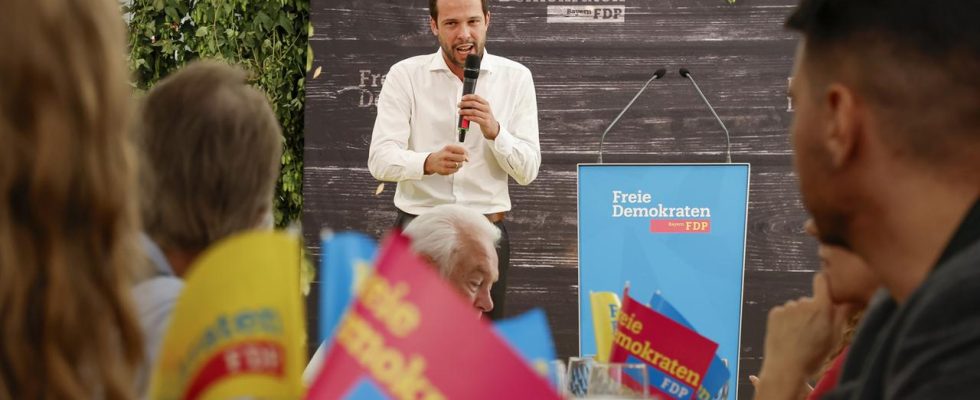Bavaria’s FDP wants to stay in the state parliament and also want to participate in government, but it could fail because of the five percent hurdle. This has to do with the traffic lights in the federal government – but not only.
“Hello, future” – that is the central slogan of the Bavarian FDP in the state election campaign. The Liberals want to appear fresh, willing to reform, competent. At the election campaign presentation, top candidate Martin Hagen drove up in a DeLorean, familiar to older people from the hit film “Back to the Future.” You can call that appropriate – or point out that the film is a good 40 years old.
However, it remains to be seen whether the FDP will be able to show its desire for tomorrow in the next state parliament. In surveys, the party was recently below the five percent threshold ARD BayernTrend it was four percent. There is a “now-more-than-now” mood in the party; in the last few meters the Liberals want to convince as many undecided people as possible.
Martin Hagen: Good speaker, but unknown
The focus of the FDP election campaign is Martin Hagen: top candidate, state leader, parliamentary group leader. The 42-year-old is one of the best speakers in the Bavarian parliament; a lack of eloquence and repartee are not his problem. But his reputation does: two out of three people in Bavaria don’t know Hagen or have no opinion about his work.
It’s not because of Hagen’s workload: election campaigns in Bavaria’s cities, social media, interviews – Hagen tries everything. However, the FDP’s staffing levels are thin. The best-known Bavarian MP is probably “Focus” founder Helmut Markwort, 86 years old. He is running again. Susanne Seehofer, daughter of the former CSU leader, also wants to be in the state parliament for the FDP.
FDPPicture book career
Meanwhile, top candidate Hagen’s career could be in the FDP picture book: At 17, he joined the Young Liberals and later became state chairman. His father is with the SPD, his son Martin is politically different. Freedom and personal responsibility were more important to him than “social equality,” he says.
In Munich, Hagen studied politics, economic history and psychology. He worked for some time as press spokesman for the FDP parliamentary group in Berlin, then returned to Bavaria as state manager. In 2018, he led the Liberals back into the state parliament after five years of extra-parliamentary opposition – by just 5.1 percent. The results after five years are not bad: the twelve-member group is considered hard-working and well-versed in terms of content.
The fact that the liberals in Bavaria traditionally have a difficult time is also due to the great competition in the so-called bourgeois camp: the CSU and Free Voters attract a lot of votes, including from the self-employed or other groups that may be more likely to vote for the FDP in other federal states.
There is also a strategic dilemma: On the one hand, the FDP criticizes the balance sheet of the CSU-led state government in many areas. On the other hand, the FDP wants and needs to form a coalition with the CSU in order to implement its own future plans. Black-yellow is unlikely in Bavaria this time: mathematically it might not be enough – and Prime Minister Markus Söder wants to continue governing with Hubert Aiwanger’s Free Voters anyway.
The trend is (not) your friend
The trend in the rest of Germany also speaks against the liberals. In the elections in Berlin and Lower Saxony they failed to pass the five percent hurdle. In North Rhine-Westphalia, the FDP halved to 5.9 percent last year. After all: In Bremen, we recently managed to get back into the city.
When the Bavarian Liberals planned their election campaign a few months ago, they had a plan. First: talk about state politics, especially about the need for reform in Bavaria’s schools. Secondly: highlight the FDP’s successes in the federal government and create a counter-narrative to the CSU’s constant criticism of the traffic lights.
But then things turned out differently. Most people in the Free State agree that there is a need for action in Bavaria’s classrooms, from equipment to the number of teachers. That the FDP is offering a far-reaching education reform, with performance-based teacher pay, later school starts in the morning and much more freedom of choice for individual schools? Hardly penetrates.
The traffic light: more millstone than engine
Instead, the election campaign is a lot about federal politics – and the traffic lights. Participation in the federal government is more of a millstone than a motor for Bavaria’s liberals. The alliance is unpopular with many supporters; the Greens in particular are seen as opponents, not as partners. It remains to be seen whether Christian Lindner will really help in the election campaign against this background – the party chairman and Federal Finance Minister has several appearances in Bavaria on the Friday before the election.
In any case, the following assumption won’t win any prizes for bold statements: If the FDP is thrown out of the state parliament in Bavaria and perhaps also Hesse, the mood in the traffic light coalition at the federal level will continue to suffer.
And now? In the final stretch of the election campaign, Bavaria’s liberals are particularly relying on the economic expertise attributed to them. They want to present themselves as a better CSU coalition partner, as an alternative to the Free Voters, who, from the FDP’s point of view, are undervaluing the Ministry of Economics with Hubert Aiwanger. One of the FDP posters says: “Heat up the economy – not tempers.”
So back to the central motto of the FDP election campaign: “Hello future”. The Duden defines the word “Servus” as follows: “Friendly greeting when saying goodbye, as a greeting”. If things go badly for the FDP, this ambiguity will fall on their feet on election evening: Then it would be “Bye, state parliament”.

